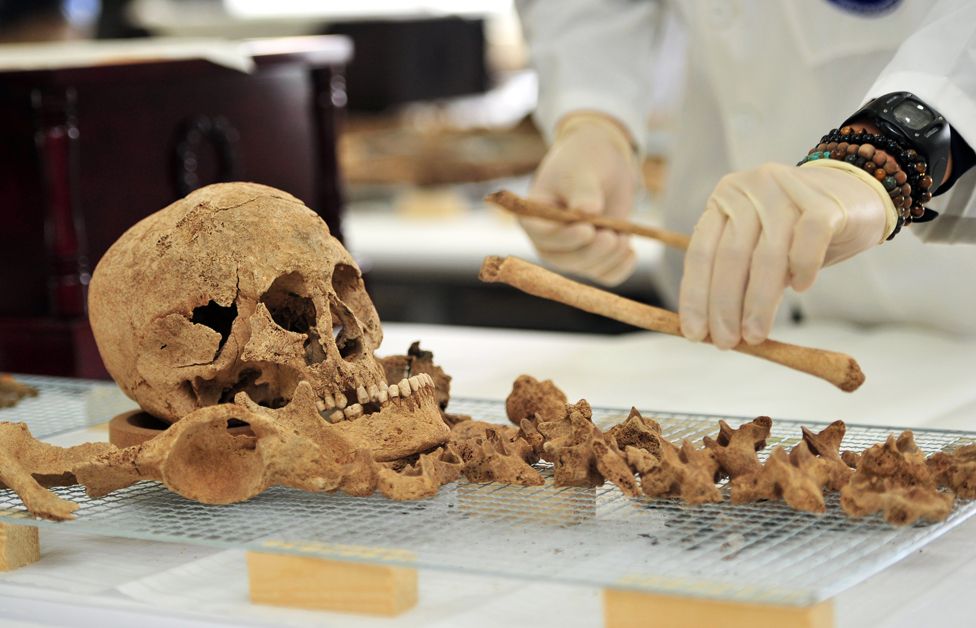The Chinese bodies still being found in South Korea
- Published

In the past week, the remains of Chinese soldiers who fought in the Korean War have been returned home - the bodies had lain in South Korea for more than 60 years. The repatriation is a sign of how close the two countries have become, so is Beijing turning its back on North Korea in favour of its wealthier neighbour?
The dead can tell you much about the living. There is nothing, I find, quite like a visit to a cemetery to lift the spirits and shed light on the way the world still turns.
Particularly a war cemetery. Within sight of the inappropriately named demilitarized zone which separates the two halves of Korea lies Cemetery 4, as this flat, bare field of gravestones is officially called.
It is hard to find among the rice paddies. Even the local farmer didn't know it was there. But with a bit of driving up and down a country road just short of the border with North Korea, you find the turn-off opposite a petrol station. At the back of the hill, the cemetery lies before you: rows of gravestones invariably inscribed with the Korean words "Moo myung In" - person with no name, it means. It is also written in Chinese.
Find out more
- From Our Own Correspondent has insight and analysis from BBC journalists, correspondents and writers from around the world
- Listen on iPlayer, get the podcast or listen on the BBC World Service or on Radio 4 on Thursdays at 11:00 and Saturdays at 11:30
These are the graves of Chinese and North Korean soldiers who died in that most brutal of civil wars between 1950 and 1953. All wars are brutal of course, but the Korean War particularly so. It divided families and villages. Brother slaughtered brother. The fighting was often at night in sub-zero temperatures. Attacks were signalled by a sudden bugle in the terrifying darkness. The fighting was bayonet to bayonet, kill or be killed.
Those from North Korea and its ally, the Chinese People's Liberation Army, whose remains were found in what is now South Korea were buried in the cemetery under, the sign there says, the Geneva Conventions and in the spirit of humanitarianism.
That spirit was not obvious until recently. For decades the enemy cemetery, as it was known, was just a field of rows of graves - mounds of earth marked with white wooden posts, often tilting and rotten.
But as relations with China improved proper gravestones were placed. Today the stones only mark where the graves once were. The remains beneath have now been removed and returned to China to be buried at what's called the Resist America and Help Korean Martyrs Cemetery in the city of Shenyang.
However, the remains of the North Korean soldiers remain in South Korean earth. There has been no repatriation of bodies because relations between the two halves of Korea are still so bitter. North Korea has argued that since there is only one Korea (its Korea), bodies in the South are buried at home. This is no corner of a foreign field for Pyongyang.
In contrast, China and South Korea have a reasonably amicable relationship built on trade. These days, China is at odds with its ideological comrades in Pyongyang but at ease with the capitalists in Seoul.
The thaw between Beijing and Seoul started four years ago when the leaders of the two countries accepted that money should trump ideology. China is now South Korea's biggest trading partner, bigger than the United States. While Beijing threatens to squeeze Pyongyang, its former ally, it warms to the goods made by its former foe in the Korean war. It imports everything from soap operas to cars - and now also takes in the bodies of its soldiers.
Their remains have emerged in the decades since the fighting stopped. They're often unearthed in remote, overgrown military trenches, deep in forests. These sites still chill and silence because it's so easy to imagine that terror of a fatal moment nearly seven decades ago. The recovered remains are analysed to try to identify the deceased - some scrap of a uniform may help, a weapon, a bullet from a belt.
I said that the cemetery is barely visited and that is true, but there were signs of remembrance when I was there - three bunches of flowers, one of which had been placed by South Korean veterans, though later bowled over and tumbled across the grass by the wind.
The cemetery is a testament to the blood-soaked history of the peninsula. Here, South Korean veterans leave tributes to Chinese and North Korean troops in a peacetime unity of comrades who would once have killed each other had they met on the battlefield.
And the Chinese dead return home while the North Korean fallen remain in enemy earth. Even the dead cannot escape politics.
Subscribe to the BBC News Magazine's email newsletter to get articles sent to your inbox.